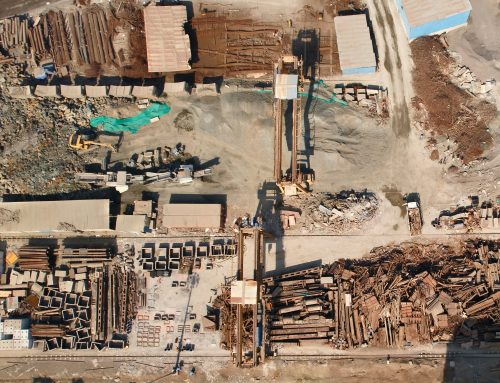As our global consciousness about the environment continues to expand, understanding the correct methods for recycling metals becomes increasingly vital.
For those working in the construction industry including engineers, builders, and plumbers, recycling metals correctly, including both Non-Ferrous and Ferrous types, is crucial. In Australia, the construction sector produces a massive 27 million tonnes of waste each year, and this includes metals. This sizable contribution makes up a remarkable 44% of the entire waste produced by the country, as indicated in the National Waste Report 2020.
Embark on a journey as we delve into the world of sustainable recycling for both Non-Ferrous and Ferrous metals. Discover how Southern Cross Metal Recyclers can contribute to this mission. Together, let’s shape a future greener future!
What Is Ferrous Metal?
Ferrous metals fall into a unique category defined by their significant iron content. This composition grants them magnetic properties, allowing them to interact with magnetic forces. However, it’s important to note that, much like any material, they have their sensitivities. When exposed to moisture and oxygen, these metals can display susceptibility to rust. This arises from the interplay between their iron composition and the surrounding environment.
Here are some common examples of ferrous metals:
- Steel
- Cast Iron
- Wrought Iron
- Mild Steel
What Is Non-Ferrous Metal?
Non Ferrous metals set themselves apart by their lack of iron content. What elevates these metals are their exceptional traits – corrosion resistance that stands the test of time, conductivity, and a feather-light quality. It’s this blend of characteristics that make Non-Ferrous metals not just unique, but essential players in the construction industry.
Common examples of Non-Ferrous metals:
- Aluminum
- Copper
- Brass
- Bronze
- Nickel
- Titanium
- Lead
- Zinc
- Stainless Steel
- Alloy Steel
Benefits of Recycling Non-Ferrous & Ferrous Metals:
Resource Conservation: Both Ferrous and Non-Ferrous metals, such as iron, steel, aluminum, and copper, are limited resources. By recycling them, we reduce the demand for mining and extraction, preserving these valuable materials for future generations.
Energy Efficiency: Recycling is an energy-efficient alternative to producing metals from raw materials. It requires less energy and generates fewer carbon emissions, contributing to a more sustainable manufacturing process. Substantial energy conservation is achieved through recycling instead of mining new metal ores. For example, recycling aluminum consumes just 5% of the energy required for producing virgin aluminum.
Waste Reduction: The predominant method of disposing of scrap metal is by burying it in landfill sites. Recycling both Ferrous and Non-Ferrous metals diverts them from landfills, minimising waste accumulation and reducing the strain on waste management systems.
Economic Growth: The recycling industry spurs job creation and economic development. By recycling these metals, we support local economies and decrease reliance on expensive imported raw materials.
Environmental Impact: Recycling helps lower greenhouse gas emissions associated with raw material extraction and processing. This contributes to cleaner air, reduced pollution, and a healthier environment.
Challenges and Solutions in Non-Ferrous and Ferrous Metal Recycling
Metal recycling, while undoubtedly beneficial for the environment and resource conservation, is not without its share of challenges.
One of the primary obstacles is the presence of complex alloys and contaminants in scrap metal. These impurities can complicate the recycling process, affecting the quality of the recycled material and increasing the energy and resources required for separation and purification. Additionally, the varying compositions of metals in different products can lead to inconsistency in recycling techniques.
To address these challenges, innovative solutions have emerged. Advanced sorting technologies equipped with sensors and systems are being employed to identify and segregate various metal types and alloys accurately. These technologies streamline the sorting process, ensuring that the right materials are processed together, improving efficiency, and minimising contamination.
How Southern Cross Recycling Metals Can Help Recycle Your Ferrous & Non-Ferrous Metals:
Ferrous Metal and Non-Ferrous Recycling Process:
- Southern Cross Metal Recyclers gathers Ferrous and Non-Ferrous metals you no longer need from a variety of origins, utilising convenient pickup services and 24-hour drop-off options.
- Collected materials undergo thorough inspection and preparation, including cleaning and coatings removal.
- Advanced shredding equipment breaks the metals into smaller fragments, enabling effective separation.
- Magnetic properties allow easy separation using powerful magnets, followed by refining.
- Shredded and separated ferrous metals are melted in high-temperature furnaces, and closely monitored for quality.
- Molten metal is cast into molds for maximum reuse, minimising raw material demand.
Partnering for a Greener Future:
At Southern Cross Metal Recyclers, we are committed to responsible Non-Ferrous and Ferrous recycling. By partnering with us, you contribute to reducing metal waste pollution, conserving resources, and promoting a sustainable future. Visit our website for more information on how we can work together to make a positive impact on the environment!



Leave A Comment